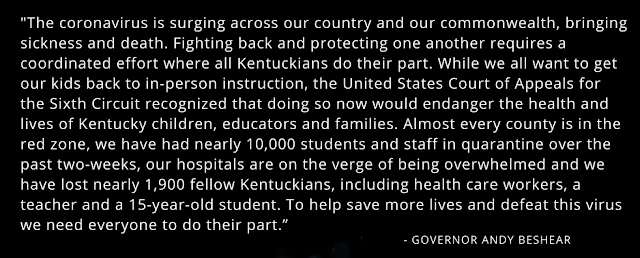Federal appeals panel says Beshear’s ban on in-person schooling can apply to religious schools; positive-test rate jumps to 9.24%

Part of a slide published by Gov. Andy Beshear in response to federal appeals court’s ruling
—–
By Al Cross
Gov. Andy Beshear’s ban on in-person schooling will remain in effect at all Kentucky schools while federal judges consider whether it can apply to religious schools that follow social-distancing and hygiene rules.
On Nov. 18, Beshear banned in-person schooling effective Monday, Nov. 23, and said middle and high schools mist remain in remote or virtual instruction until at least Jan. 4. He allowed elementary schools to resume in-person instruction Dec. 7 if they follow state guidance and are not in the state’s red zone, for the highest rates of infection. The order was part of several new restrictions to thwart the pandemic.
They wrote, “Primarily because plaintiffs are unlikely to succeed on the merits of their free-exercise claim, the preliminary injunction should not have been entered. This is because of the likelihood that our court will rule that the order in question is neutral and of general applicability,” a standard applied to cases involving religion, along with a standard of “strict scrutiny.” The panel wrote, citing a key word from Chief Justice John Roberts, “Any burden on plaintiffs’ religious practices is ‘incidental’ and therefore not subject to strict scrutiny.”
In his daily press release on the pandemic, Beshear announced the positive-test rate and the new-case total without noting that the latter was the largest reported on a Sunday. The seven-day rolling average of new cases rose to 2,727 after declining for the two days after Thanksgiving, the day that the state reported the largest number of new cases in a day, 3,870.
Health Commissioner Steven Stack said in the release, “The massive increase of covid-19 in the commonwealth during November has shattered prior records. As we finish the Thanksgiving weekend, we need to show our kindness and caring for each other now more than ever. The spread of the virus is at an all-time high, but science and experience have shown that we are not powerless to shape our future. If we all wear masks, stay six feet away from those outside our home, limit travel and stay home if we are sick, we can put ourselves on a better path, stay safe and suppress covid-19.”
- Counties with more than 10 new cases were: Jefferson, 471; Fayette, 314; Daviess, 132; Hardin, 103; Boone, 93; McCracken, 74; Kenton, 70; Campbell, 62; Henderson, 60; Elliott, 47; Bullitt, 42; Perry, 39; Boyd, 38; Jessamine, 37; Warren, 37; Christian, 36; Simpson, 36; Greenup, 34; Graves, 33; Rowan, 32; Whitley, 31; Boyle, 29; Floyd, 29; Madison, 28; Pike, 28; Nelson, 25; Marshall, 24; Lincoln, 23; Scott, 22; Woodford, 22; Calloway, Laurel and Oldham, 21; Ohio, 20; Leslie, 19; Breathitt, Caldwell and Grant, 18; Harlan, Harrison and Johnson, 17; Muhlenberg, 16; Marion and Washington, 15; Bath, Clay, Franklin and Mercer, 14; Knox, Meade and Taylor, 13; Garrard, Magoffin, Martin and McLean, 12; and Hopkins, Knott, Montgomery, Morgan and Pulaski, 11.
- Dr. Anthony Fauci, director of the National Institute of Allergy and Infectious Diseases, said on NBC‘s “Meet the Press” that when he warns about “a surge superimposed on that surge that we’re already in . . . I don’t want to frighten people, except to say it is not too late at all for us to do something about this.” But he acknowledged, “I’d have to say honestly unless something changes dramatically, which I don’t see that happening, because the curves, when you look at the dynamics of an outbreak, that you see usually a three, four, five-week period of time before curves start really coming down. So, I think we’re going to be faced with another situation. We’re going to have to make decisions as a nation, state, city, and family, that we’re in a very difficult time and we’re going to have to do the kinds of restrictions of things we would like to have done, particularly in this holiday season, because we’re entering into what’s really a precarious situation because we’re in the middle of a steep slope.”
- Asked what he would say to President-elect Joe Biden if he asked on Inauguration Day, “What’s the first thing you want me to do, Dr. Fauci?” the doctor replied “make sure that the vaccines get distributed in an efficient and equitable way” and “the broader testing, namely one that’s less sensitive but that’s testing people who are not symptomatic, namely a much broader blanket over the country in a way that’s easy, that’s cheap, that is even a home test. I’m going to be pushing for that because I think when you really allow us to know in a very quick way what the penetrance of infection is in any given way, I think that’s going to be very important because the virus is being spread throughout the country by people without symptoms. So, we’ve got to go beyond the symptomatic people and get a better understanding of the asymptomatic transmission.”